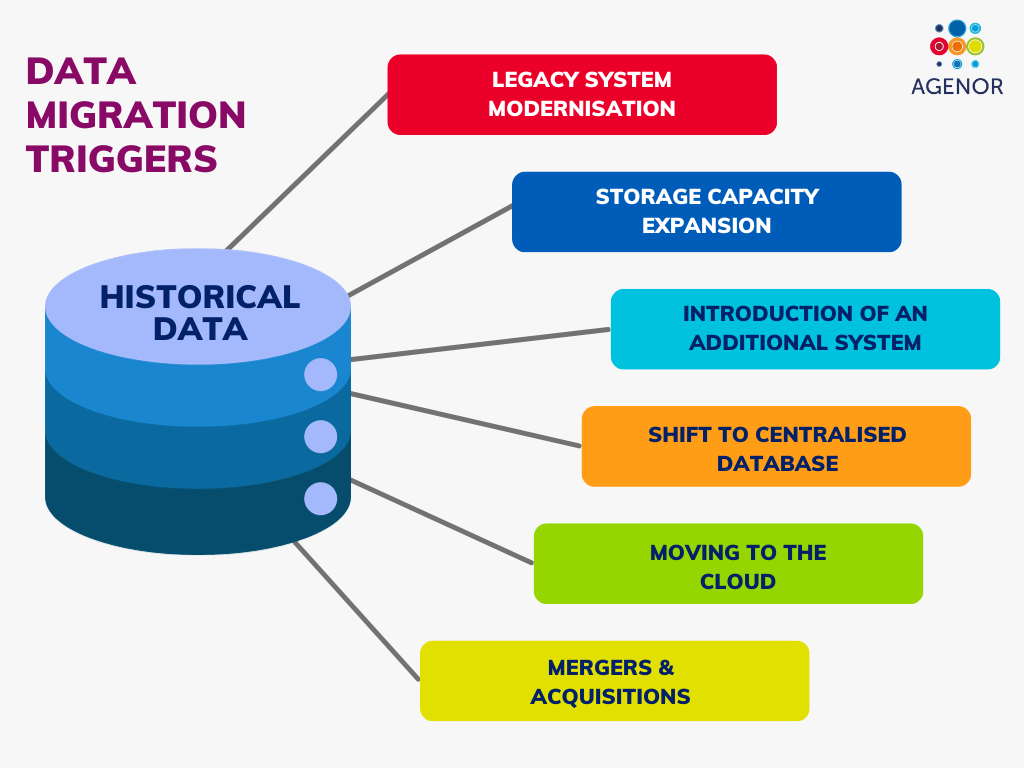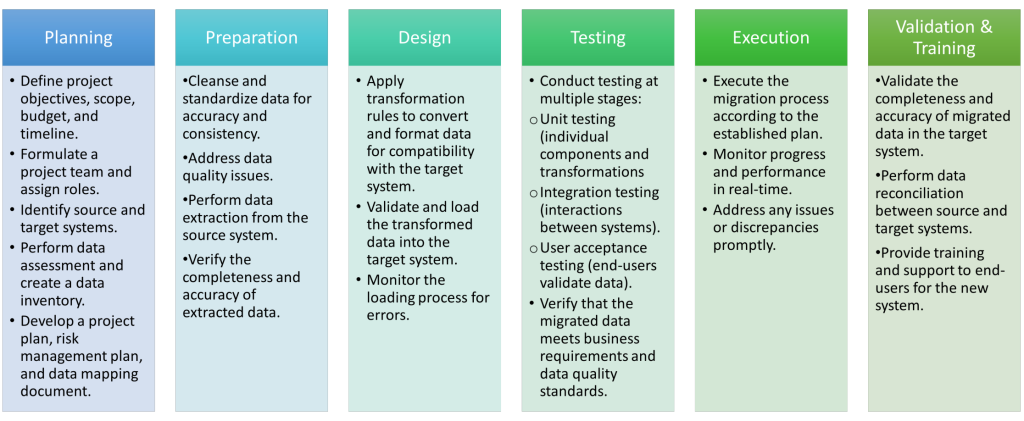Agenor Technology’s latest blog which offers advice on how organisations can master their next data migration programme.
Introduction
In today’s fast-paced business environment, data migration has become an essential undertaking for
organisations aiming to keep up with technology advancements, achieve operational efficiency, and
stay competitive. The successful execution of a data migration project can be a game changer, while
failure can have far-reaching consequences. In this blog, we will explore the world of data migration
and unveil how partnering with a project delivery specialist can be the key to mastering seamless and
successful data migrations.
The Crucial Role of Data Migration
Data migration is the process of moving data from one system, application, or platform to another.
Whether it’s transitioning from legacy systems to modern cloud-based solutions, merging data after
an acquisition, or enhancing data quality, data migration is a critical procedure for organisations of all
shapes, sizes and industries.
Data is not just a collection of bytes; it represents a company’s history, its customers, its products, its
services, and its future. The ability to move this data efficiently and accurately from one place to
another can have a profound impact on an organisation’s ability to adapt, grow, and compete in a
rapidly changing business landscape.

The Complex Nature of Data Migration
Data migration projects are complex and multifaceted. They involve various stages, from planning
and data assessment to execution and validation. These projects require meticulous attention to
detail, comprehensive project and risk management, and a deep understanding of data structures,
business objectives, and technology stacks.
The complexity of data migration often arises from a combination of factors:
- Data Volume: Handling large volumes of data can be challenging and may require specialist tools and processes.
- Data Diversity: Organisations deal with diverse data types, including structured, semistructured, and unstructured data.
- Data Quality: Ensuring data accuracy, completeness, and consistency is a significant concern.
- Data Security: Protecting sensitive data during migration is essential to prevent breaches and compliance violations.
- Data Mapping and Transformation: Mapping data from source to target systems and transforming it to fit the new structure is a complex task.
- Business Continuity: Minimising downtime and ensuring business operations continue smoothly during migration is critical.
Given these complexities, it’s no surprise that data migration projects can be daunting for
organisations. However, with the right expertise and support, these challenges can be effectively
managed and overcome.
The Data Migration Process
While data migration is complex process, the data migration process outlined below provides a more
concise overview of the key steps involved. However, it’s essential to note that the specific needs and
complexity of each data migration project will ultimately determine the precise process to be
followed. Depending on the project scope there may also be considerations for the project delivery
team around data retention, back up and change management to ensure overall success of the
migration.

Why Data Migration Projects Fail
Despite the importance of data migration, these projects often face significant challenges, and
failures are not uncommon. McKinsey research in 2021 found for companies transitioning more
workloads to the public cloud, poor coordination is costing the average company 14 percent more in
migration spend than planned each year, and 38 percent of companies have seen their migrations
delayed by more than one quarter.
Some of the key factors that contribute to data migration failures include:
- Lack of Expertise: Inadequate knowledge and experience in managing data migrations can lead to critical errors and project setbacks. Without a deep understanding of data structures, transformation rules, and data quality requirements, organisations are more likely to encounter roadblocks.
- Poor Risk Management: Failing to identify and mitigate potential risks early in the project can result in disruptions and failures. Risks can encompass technical issues, data quality problems, security breaches, and compliance violations. A lack of proactive risk management strategies can leave organisations ill-prepared to handle unexpected challenges.
- One-Size-Fits-All Approach: Using generic migration strategies that don’t consider an organisation’s unique needs and objectives can lead to suboptimal results. Every organisation has its own data intricacies, business processes, and compliance requirements. Failing to tailor migration strategies can result in misaligned outcomes.
- Inefficiency: Prolonged migration timelines, resource mismanagement, and technical inefficiencies can increase costs and disrupt business operations. The longer a migration takes, the greater the potential for disruptions and increased expenses. Inefficient processes can strain resources and impact an organisation’s ability to adapt to changing circumstances.
- Post-Migration Challenges: Neglecting the importance of post-migration support and optimization can result in ongoing issues and dissatisfaction among users. A successful data migration doesn’t end when the data is transferred. Ensuring that the new system operates smoothly and meets business needs is equally important.
The Advantage of Engaging a Specialist Data Migration Partner
This is where a specialist Data Migration Project Delivery can step in to redefine the data migration
landscape, offering a range of benefits that can make the difference between a smooth, successful
migration and a costly, disruptive failure.
1 – Expertise That Matters
When selecting a specialist delivery partner choose a team of seasoned experts with a wealth of
experience in managing complex data migration projects. Specialists who have successfully executed
numerous projects across various industries, will be well-equipped to navigate the unique challenges
and nuances each project presents. Data migration is more than just moving data; it’s about ensuring
data quality, security, and alignment with business objectives.
A good partner will bring a wealth of expertise to the table:
- Technical Proficiency: Expertise in using data migration tools, technologies, and best practices. In particular, the technical know-how to handle data extraction, transformation, and loading (ETL) tasks efficiently is essential.
- Data Governance: Understanding of the importance of data governance and how to help your organisation establish robust data management practices during migration and beyond.
- Risk Assessment: Excellence at conducting comprehensive risk assessments to identify potential risks specific to each project and develop proactive mitigation strategies to address them.
- Data Quality Assurance: Data quality throughout the migration process should be prioritised, with rigorous testing and validation processes implemented to ensure data accuracy, completeness, and consistency.
2 – Proactive Risk Mitigation
One of the key reasons data migration projects can falter is the lack of proactive risk mitigation
strategies. In our experience at Agenor, identifying and addressing potential risks early in the project
lifecycle is crucial. Data Migration experts are adept at conducting risk assessments and developing
comprehensive risk management plans to keep the project on track.
The risk management approach must include:
- Risk Identification: Meticulous identification of potential risks, both technical and operational, that could impact the project’s success.
- Risk Analysis: Assessment of the likelihood and potential impact of each identified risk to prioritize and allocate resources effectively.
- Risk Mitigation: Proactive strategies to mitigate and manage risks throughout the project. This may involve contingency plans, mitigation actions, and risk monitoring.
- Change Control: Implementation of a robust change control process to assess and approve changes to the project scope, ensuring that unexpected challenges are addressed systematically.
3 – Tailored Solutions for Unique Needs
No two data migration projects are exactly alike. Every organisation has its own set of goals, systems,
and data intricacies. At Agenor Technology, we don’t believe in one-size-fits-all solutions. Instead, we
take a highly customized approach to each project.
Our approach to customisation includes:
- Requirements Analysis: We work closely with clients to understand their specific needs, objectives, and constraints.
- Data Mapping and Transformation: We tailor data mapping and transformation rules to align perfectly with our clients’ goals. This level of customization ensures that our clients achieve precisely what they set out to accomplish, with minimal disruption to their operations.
- Scalability: Our solutions are designed to scale with your organisation’s growth and evolving data needs.
- Data Governance Alignment: We ensure that migration strategies align with your organisation’s data governance policies and standards, safeguarding data integrity and compliance.
4 – Efficiency and Resource Optimization
Efficiency is the name of the game in data migration. The longer a migration takes, the greater the
potential for disruptions and increased costs. Excellence in optimizing migration processes,
minimizing downtime, and maximizing resource efficiency is vital.
A robust approach to efficiency includes:
- Comprehensive Project Planning: We carefully plan project timelines, allocate resources judiciously, and employ the latest project management tools and techniques to streamline the migration process.
- Resource Allocation: We ensure that resources, including personnel, technology, and budget, are allocated efficiently to prevent resource bottlenecks and delays.
- Automation: Agenor Technology leverages automation and scripting to automate repetitive tasks, reducing the risk of human errors and expediting the migration process.
- Performance Monitoring: We implement tools and techniques to monitor system performance and data processing during migration. This allows us to address performance bottlenecks promptly.
5 – Comprehensive Post-Migration Support
A successful data migration doesn’t end when the data is transferred. Ensuring that the new system
operates smoothly and meets business needs is equally important. For example, we offer
comprehensive post-migration support to address any issues or optimization opportunities that may
arise.
Commitment to post-migration support includes:
- Ongoing Monitoring: Continuous monitoring of the performance and stability of the new system to identify and address any issues promptly.
- User Training and Support: Training and support to end-users for the new system, ensuring a smooth transition and reducing user errors.
- Knowledge Transfer: Ensure that knowledge and documentation are transferred to your organisation’s internal teams, enabling them to manage and maintain the new system effectively.
- Change Management: Managing change effectively, addressing user concerns and facilitating a smooth transition to the new system.
Conclusion
In conclusion, data migration is a critical operation for organisations seeking to thrive in today’s datadriven world. However, the complexity and risks associated with data migration projects should not
be underestimated.
Partnering with a specialist in Data Migration Project Delivery, can be your key to ensuring data
migration success. With the right expertise, proactive risk mitigation, customised solutions, resource
optimization, and comprehensive post-migration support, you can embark on your data migration
journey with confidence.

